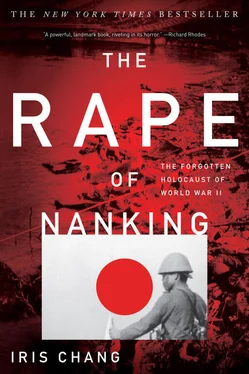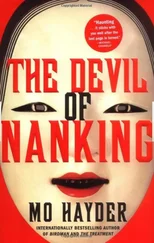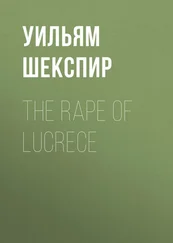Equally sobering were the fates of many of the foreigners who organized the Nanking Safety Zone. Although they sacrificed their energy and health to help the Chinese in Nanking, many of these Westerners never quite got what they deserved from life or posterity. There are no famous books devoted to these forgotten heroes of World War II, and certainly there has been no movie about them that has captured the imagination of the world public as intensely as Schindler’s List. Their spirit lives mainly in a few archives and attics from Berlin to Sunnyvale—and in the minds of a handful of survivors in China who remember them simply as the living Buddhas who saved Nanking.
Most of the Nanking survivors know the deeds of the Safety Zone leaders, but few are aware of how their lives ultimately played out. The survivors I talked with in China were saddened to learn that some of their protectors eventually endured disgrace and expulsion from China, interrogation and ostracism in their home countries, and irreparable physical and mental wounds—even suicide. Several of these foreign heroes can be considered the belated victims of the Rape of Nanking.
The experiences of Miner Searle Bates and Lewis Smythe illustrate how the facts of their heroism during the Nanking massacre were twisted for political ends. During the Korean War the PRC distorted the history of the massacre in newspaper articles to depict the Americans as the villains of Nanking who assisted the Japanese in the carnage. In the local newspaper, Lewis Smythe saw articles that accused the Safety Zone foreigners of giving over the city to the Japanese and turning over thousands of women for raping. In a similar vein, an article in the national Xinhua Yuebao charged that the Americans who remained in Nanking in 1937 “not only responded well to the imperialist policies of the U.S. Government but also protected their companies, churches, schools and residences with the blood and bones of the Chinese people.” The author insisted that the International Safety Zone Committee was an organization of imperialists who worked in “faithful collusion” with the Japanese invaders, and he quoted one Chinese survivor as saying “the American devils called out the names and the Japanese devils carried out the execution.” Pictures of the atrocities were printed with the slogan, “Remember the Nanking massacre, stop American Remilitarization of Japan!”
Such propaganda shocked and frightened Smythe, though his Chinese teacher assured him of his safety. “Dr. Smythe, there are 100,000 people in this city [who] know what you people did,” the teacher said. “There’s nothing to worry about.” Nevertheless, his days in Nanking were numbered. In 1951 he left his position at Nanking University to join the faculty of Lexington Theological Seminary in Kentucky the following year. Bates also left Nanking, but not before he had been placed under virtual house arrest by the Communists.
Smythe and Bates did not suffer as much as some of their colleagues. For several committee members, the massacre took years off their lives. David Magee, son of the Reverend John Magee, is certain that the stress of dealing with the Japanese caused the early death of his father. Other zone leaders endured years of mental agony. For example, Edith Fitch Swapp, the daughter of the YMCA secretary George Fitch, said her father had been so traumatized by the Japanese atrocities in Nanking that he often suffered complete amnesia when delivering lectures on the subject. This happened at least twice when Fitch spoke about the Sino-Japanese War in front of large organizations in the United States.
Robert Wilson, the Nanking University Hospital surgeon, paid the price of Nanking with his health. His widow recalled that while other doctors on the zone committee carefully paced themselves and went to Shanghai at least once a week to catch up on sleep, Wilson recklessly worked nonstop without taking breaks. Surgery consumed most of his energy during the day, while Japanese soldiers interrupted his sleep at night when he was called away from home time and again to stop a rape in progress. He operated, it seemed, on adrenaline alone. Finally, his body rebelled. In 1940 violent seizures and even a mental collapse forced Wilson to return to the United States, where he rested for a year in Santa Barbara, California. He never returned to China, nor did he fully recover from the strain. In the United States Wilson not only endured both seizures and nightmares but also experienced trouble focusing his eyes in the morning.
Minnie Vautrin paid the price with her life. The Nanking massacre took a deeper psychic toll on her than any of the other zone leaders or refugees had realized at the time. Few were aware that under a legend that had grown to mythic proportions was a vulnerable, exhausted woman who never recovered, either emotionally or physically, from daily exposure to Japanese violence. Her last diary entry, dated April 14, 1940, reveals her state of mind: “I’m about at the end of my energy. Can no longer forge ahead and make plans for the work, for on every hand there seem to be obstacles of some kind. I wish I could go on furlough at once but who will do the thinking for the Exp. course?”
Two weeks later she suffered a nervous breakdown. At the bottom of the last page of her diary is a sentence that was written, no doubt, by somebody else: “In May 1940 Miss Vautrin’s health broke, necessitating her return to the United States.” Her niece recalls that Vautrin’s colleagues sent her back to the States for medical help, but during the voyage across the Pacific Ocean she tried repeatedly to kill herself. A friend who accompanied Vautrin could barely restrain her from jumping over the side of the ship. Once in the United States, Vautrin entered a psychiatric hospital in Iowa, where she endured electroshock treatment. Upon her release, Vautrin went to work for the United Christian Missionary Society in Indianapolis. Her family in Shepherd, Michigan, wanted to visit Vautrin, but she discouraged them by writing that she would be coming to see them soon. A fortnight later Vautrin was dead. On May 14, 1941, a year to the day she left Nanking, Vautrin sealed the windows and doors of her home with tape, turned on the gas, and committed suicide.
Then there was the fate of John Rabe, whose life remained a mystery to historians for years. Before he was summoned back to Germany, Rabe had promised the Chinese in Nanking that he would publicize the Japanese atrocities in his homeland and try to seek an audience with Hermann Göring and even Adolf Hitler. People in Nanking prayed that Rabe’s presentation would compel Nazi leaders to exert pressure on the Japanese government to stop the carnage. Before Rabe’s departure, a Chinese doctor had asked Rabe to tell the Germans that the Chinese were not Communists, but peace-loving people who wanted to live in harmony with other nations. After a round of tearful farewell parties in February 1938, Rabe departed for Germany with a copy of John Magee’s film of the Nanking atrocities. After that point in time, he vanished from all the records, and his whereabouts baffled scholars for decades.
I was determined to get to the bottom of the story for two reasons. First, the irony of a kind-hearted Nazi working with American missionaries to save Chinese refugees from Japanese soldiers was too intriguing for me to ignore. And second, I was convinced that something terrible must have happened to Rabe after he returned to Germany. Rabe, after all, did not appear at the International Military Tribunal of the Far East to testify with his colleagues about the horrors of Nanking. Also, an oral history interview with one of his friends indicated that Rabe had somehow run afoul of Hitler’s government. But the friend failed to provide specific details, and by the time I came across the transcript he was no longer alive to give me the full story.
Читать дальше











